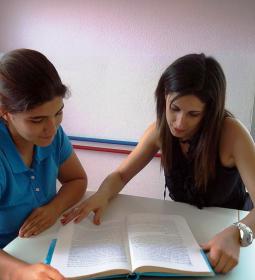Learning a language is like climbing a mountain: the steeper the climb, the more interesting the views! Some languages are easy and friendly: a couple of tenses, a few conjugations, and you are almost a polyglot. But with others, you have to dance a real linguistic tango, where a step forward is three steps back. Why do some languages seem more difficult than others? Phonetics, grammar, and the way "they" write play a role here. Let's look at five languages that do not forgive frivolity, but captivate in a serious way.
Chinese (Mandarin): Four tones and thousands of characters
Taking up Mandarin Chinese is like agreeing to a marathon: you know it's going to be hard, but you go anyway!
Grammar difficulties
At first, it seems that the grammar is simple: no gender, number, or conjugations. But this is a trap, because everything is based on the context. Say the same word, but in the wrong order, and your message may already turn into a puzzle. Do you want to tell me that something happened yesterday? Instead of changing the ending, add the particle "le", but try to remember when and where it is needed!
Ah, this tonal system...
This is where Mandarin becomes a real test. Four tones. Four! This means that the word "ma", pronounced in different ways, can mean almost anything: from "mother" to "horse". It seems that they said something simple, and the person opposite suddenly gets offended. Intonation decides everything.
Writing is a sport of the highest achievements
Each hieroglyph is a word. Learn the alphabet? No: for the basic level, you will need to know 3000 characters, and in each nuance, each stroke must be in its place. But those who master it can call themselves masters of attention and perseverance.

Arabic: right-to-left writing and a million dialects
The Arabic language is perhaps like a desert: beautiful, but full of challenges. It is beautiful, melodic and incredibly difficult.
Grammatical riddles
If you are used to languages where there is an alphabet and the roots of words are more or less predictable, then get ready: Arabic is based on three-letter roots. From one "k-t-b" you can make a whole "family" of words: a book, a writer, and the act of writing. Want to add temporary forms? Here are the additions, prefixes, suffixes and suffixes again.
Who came up with the idea not to write vowels?!
If you like clarity, alas, Arabic won't have it. Vowels are most often omitted, and you will constantly ask: "How to read this word?" Here only experience or intuition can help.
Millions of dialects
Literary Arabic is difficult to learn, but it is possible. When you go to Egypt, for example, you will find out what they're saying there... in an almost different language. Arabic dialects are often not similar to each other, and this is an additional bar of difficulty for students.
Finnish: the land of a thousand cases
The Finnish language is like exquisite exotics. In principle, it does not resemble any European language, and its grammar is almost mathematics.
How many cases are fifteen or seventeen?
For Finnish, it's hard to even decide how many cases it has! Each Finnish case serves as a separate semantic mechanism. Is the house standing? This is talo. Have you entered the house? He's already taloon. Did you leave the house? So be it, talosta.
Composite words are a challenge for the brain
Difficult Finnish words seem like works of art. Try to say lentokonesuihkuturbiinimoottoritehdas! Yes, yes, this is one word, it is also "manufacturer of jet engines for aircraft", if it is clearer.
Japanese: it's three alphabets in one
Japanese is not just a language, it's a lifestyle: everything about it is imbued with respect, aesthetics, and incredible complexity.

Grammar with a new way of looking at the world
In the Japanese world, the words are read the other way around: "I read a book" rather than "I read a book." In this language, everything is based on respect and social context, so the way you speak changes depending on who you are addressing. A single phrase like "Have you eaten?" sounds different to friends, bosses, or complete strangers.
Poor Writing Students
Three writing systems. Hiragana and katakana are 46 characters each, but that's not all, there are also kanji characters — and there are thousands of them. Did you learn one? Well done, and it immediately changes the meaning, as soon as you use it in a different context.
Navajo: A Language for the Diligent
This language fascinates with its antiquity and uniqueness, but it requires a lot. Even the words in it are whole sentences.
Phonetic acrobatics
Throat sounds, which are not found in English, can almost break the vocal cords of a beginner!
Not quite an alphabet
Although the Navajos use the Latin alphabet, they add their own special effects to the traditional script — additional symbols, guttural accents, and... the desire to find a simpler textbook...
He who has mastered the tongue will master everything!
Complex languages are a challenge: they train the brain, build character and give you the opportunity to see the world in a new way. If something seems insurmountable, then perhaps this is what needs to be conquered? So choose – Mandarin, Arabic, Japanese, Finnish, or even Navajo – and start your journey, because there, beyond the linguistic pass, stunning views await you (and the prevention of dementia, as scientists say).
Language complexity is a puzzle showing how minds encode reality in sound. To understand deep structures, evolution, and learning mechanisms requires deep knowledge. Studying linguistics at a top university, where theory meets research and practice, builds expertise for professional analysis of any language system.









